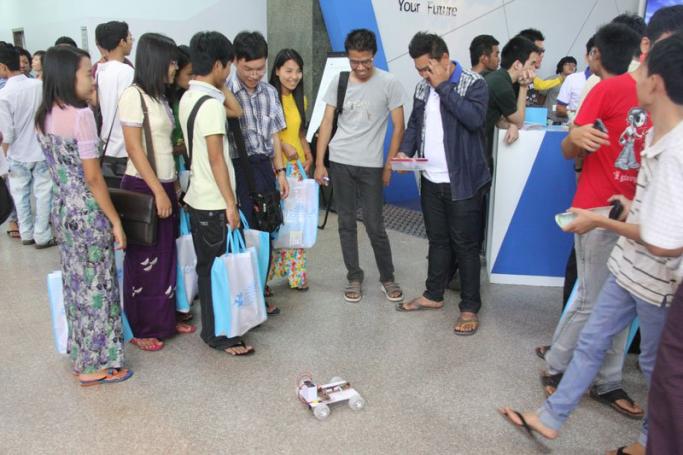If you want to be popular, invest in a football team. Politicians and business tycoons the world over understand this truism and Myanmar is no exception to the rule.
Witness the recent frenzy over the near victory of the national under-23-years-old football team at the 28th South-East Asia (SEA) Games in Singapore. At the 27th SEA Games, hosted by Myanmar in Nay Pyi Taw, the national youth team didn’t make it beyond the group stage, but in Singapore, with strong vocal support from the Myanmar spectators who packed the stadium, the team made it to the finals.
Although they were ultimately defeated by their Thai opponents, the Myanmar footballers returned as national heroes.
One source of the football team’s noticeable improvement during the two-year break between the biennial regional sports event can be traced back to the deep pockets of Myanmar’s so-called “tycoons” who have provided generous financial support to the Myanmar National League football clubs, systematically nurturing young talent.
These tycoons earned some political payback when their investments proved winners, or at least, near winners.
The football example begs the question of why not seek similar investments in Myanmar’s more cerebral human capital, such as the nation’s fledgling information and communications technologists.
Myanmar is far behind its South-East Asian neighbors in this field, but with a little investment by the private sector the country could narrow the gap, experts say.
Myanmar does not lack the human resources. Every year, about 2,800 ICT students graduate from universities in Myanmar.
In Myanmar, the new generation of IT specialists receive little or no financial support in their studies from the government or the private sector. If the super rich were willing to invest in this young high-tech talent, as they have in brawny footballers, Myanmar’s IT sector might be able to catch up quicker with its neighbors.
Ko Soe Thiha Naung, the chief technology officer of Pwint Lin Myanmar Shaysaung Group, said this will only happen if business tycoons are willing to suffer initial financial losses for their high-tech human resource investments, as they do with footballers.
“One strength in this area is a place like Sulea Tech, which was opened a few days ago. [IT experts] can decide whether they will join it or not, but this is not the only step. We should find capital,” Naung said. “And we should find businessmen who can accept financial losses,” he added.
Myanmar’s high technology sector is diverse. There are many young software developers in the country and some have even created robotics technology. Software developers can apply their knowledge to business purposes, but unlike some neighboring countries, Myanmar lacks the infrastructure for conducting experiments and trail runs for new inventions.
Take for instance the case of Ma Theint Thazin, an IT student at the West Yangon Technological University who is carrying out a robotic technological project.
Is enough being done to invest in Myanmar's tech talent? Photo: Bo Bo/Mizzima
“While we are inventing, if there were places we could make experiments free of charge, it would be good. As for now, we have waste a lot of time trying to collect money. It is inconvenient. If someone allowed students to use their apparatus or if someone provided financial support to students, it would be convenient,” she said.
Ko Kyaw Thiha, second-year student at Mandalay Technological University, said students often had to use their own pocket money in invest in their projects.
Young people are very keen to make inventions, but they should not have to fund their projects.
Normally, young students don’t have regular income. How will they solve their financial problems? It would be best if there are investors who would fund their projects.
But in investing in technological sector, businessmen should not expect quick profits. Instead, they should give priority to the development of the country, and seek the social kudos that comes from backing potential winners. That’s why business tycoons nurture young footballers.
Sports can promote the country’s dignity. If businessmen support the technology sector, their investments will not only promote the country’s dignity but also help develop the economy.
In other countries, governments have put in place suitable policies to support their country’s technological sector.
If the government set good policies to support the technology sector, such as tax incentives for investments in research and development, the private sector will be interested to invest in the sector. If so, the creativity of young people will improve, and it will help the country develop.
At the “Myanmar Software Showcase 2015” exhibition held in Nay Pyi Taw in early April, Myanmar developers proudly exhibited their software. Similarly, at the “2015 Student Show Art and Science” exhibition held at MICT Park, Yangon, in February, students exhibited their technological projects.
At the “2015 Student Show Art and Science” exhibition, Myanmar students displayed their creations including remote-controlled aircraft, a submarine design, and sensor controlled car.
According to academic sources, some 80 per cent of Myanmar graduates from technological universities in Myanmar have failed to find jobs in their field of study. About 10 per cent of Myanmar technology graduates work overseas. This is a huge loss for the country.
So, Myanmar should create more high-tech jobs for the Myanmar technology graduates who cannot find jobs overseas. If so, the country will be able to fully exploit its human resources.
Like the football sector, if the government or business tycoons make investments to nurture young technologists, the country will have the golden age of technological sector within a short period. May Myanmar’s technology sector improve, just as Myanmar’s football sector has done already.
This Article first appeared in the July 16, 2015 edition of Mizzima Weekly.
Mizzima Weekly is available in print in Yangon through Innwa Bookstore and through online subscription at www.mzineplus.com












